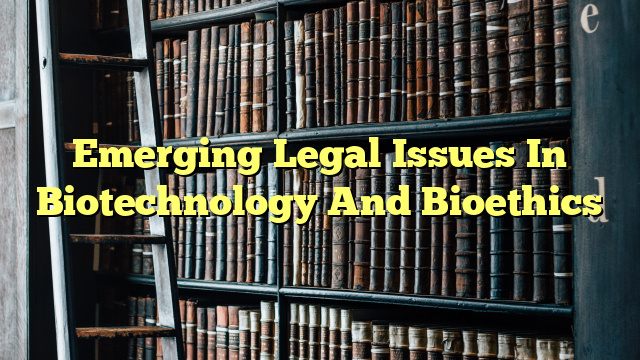Biotechnology is an ever-evolving field, and the legal issues that accompany it are constantly changing. This paper will explore the various emerging legal issues in biotechnology and bioethics, with a particular focus on the top 5 ethical issues in biotechnology medicine and the implications they have for current and future legal rulings.
Table of Contents
- Issues of Bioethics in Biotechnology
- Major Issues Concerning Biotechnology
- Top 5 Ethical Issues in Biotech Medicine
- Emerging Issues in Ethics
Issues of Bioethics in Biotechnology
Bioethics is a branch of ethics that deals with the moral implications of advances in the life sciences and biotechnology. Issues of bioethics in biotechnology include the moral implications of genetic engineering, cloning, and gene therapy. While biotechnology has many positive applications, such as the development of new drugs and treatments, it also raises many ethical questions. For instance, should genetic engineering be used to create “designer” babies, or to create animals that are used for scientific research? How should we handle the potential risks associated with gene therapy or cloning? These are just some of the questions that bioethicists must grapple with when considering the ethical implications of biotechnology.
Major Issues Concerning Biotechnology
In addition to ethical issues, biotechnology also raises a number of legal issues. For instance, there is still a great deal of debate about the patenting of living organisms, as well as the ethical implications of this practice. In addition, there is still controversy over the safety of genetically modified foods, and whether or not such foods should be labeled as such. Finally, there is debate over the regulation of biotechnological research, with some arguing for more stringent measures to protect the public from potential risks, while others argue that such regulations stifle innovation.
Top 5 Ethical Issues in Biotech Medicine
The top 5 ethical issues in biotechnology medicine include the following:
- The use of human embryonic stem cells in research and treatments.
- The safety and efficacy of genetically modified foods.
- The patenting of living organisms.
- The ethical implications of cloning and gene therapy.
- The regulation of biotechnological research.
Each of these issues has important legal and ethical implications, and it is important for policy makers, researchers, and bioethicists to remain knowledgeable about the latest developments in these areas.
Emerging Issues in Ethics
The legal issues surrounding biotechnology and bioethics are ever-evolving, and new ethical issues are constantly arising. For instance, one recent development is the use of artificial intelligence (AI) technologies in healthcare. AI-driven technologies may help to reduce the cost of healthcare, but they also raise ethical concerns about privacy, autonomy, and the potential for bias. Other emerging ethical issues in biotechnology include the implications of using gene editing technologies, the regulation of prices of pharmaceuticals, and the ethical issues surrounding the use of animals in research.
In conclusion, biotechnology is an evolving field and the legal and ethical issues that it raises are constantly changing. It is important for policy makers, researchers, and bioethicists to stay abreast of the latest developments in this field in order to ensure that the legal and ethical implications of biotechnology and bioethics are adequately addressed.

